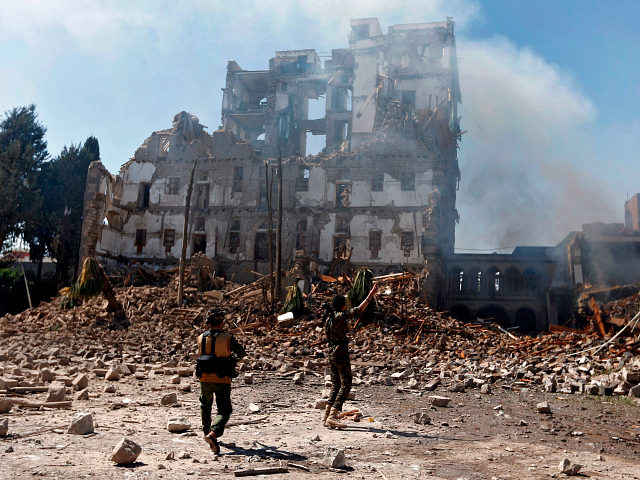Media aligned with the Houthi insurgents in Yemen reported on Wednesday that the Saudi-led coalition intervening in Yemen’s civil war intensified its airstrikes against positions occupied by rebels.
Among those positions were the residence of Yemen’s ex-president, Ali Abdullah Saleh, who was gunned down by his erstwhile Houthi allies this week. The U.N. reported at least 25 airstrikes in the Yemeni capital of Sanaa over the past 24 hours.
Reuters suggests the coalition is looking to hit the Houthis at a moment of vulnerability, as they scramble to regain control of the capital of Sanaa after a street battle with Saleh loyalists that culminated in the Houthis declaring him a traitor and murdering him. This prompted Saleh’s son to swear vengeance for his father’s killing and possibly shatter the insurgent coalition once and for all:
The intervention by Saleh’s son Ahmed Ali, a former commander of the elite Republican Guard who lives in exile in the United Arab Emirates and was once seen as a successor to his father, has provided the anti-Houthi movement with a potential figurehead.
Abu Dhabi Crown Prince Mohammed bin Zayed al-Nahayan, the de facto leader of the UAE, visited Ahmed Ali at his residence to offer his condolences, according to Sheikh Mohammed’s Twitter account. He posted a picture of himself sitting near Ahmed Ali.
Ahmed Ali had been widely expected to leave the UAE, a key member of the Saudi-led coalition fighting the Houthis, for Yemen to help in the war amid media reports that some Saleh loyalists have been switching sides.
“I will lead the battle until the last Houthi is thrown out of Yemen. The blood of my father will be hell ringing in the ears of Iran,” Ahmed Ali vowed on Tuesday.
The Houthis are reportedly weeding out Saleh supporters from their ranks, treating them much as they did Saleh himself. They have striven to portray Saleh as a traitor who sold out to the hated Saudis, who are the great regional rivals to the Houthis’ patrons in Iran. To that end, on Saturday Houthi forces attacked and overran a TV station in Sanaa that was allied with Saleh, taking over 40 staffers hostage.
A protest held in Sanaa by dozens of women demanding Saleh’s body be turned over for a proper burial was “violently dispersed” by Houthi forces on Wednesday. Saleh’s bloody body was displayed in an online video, shocking and enraging his followers.
The Washington Post reports that Aboul Gheit, head of the Arab League, denounced Saleh’s death as an “assassination” by “criminal militias” and called upon the international community to designate the Houthis a terrorist organization.
“All means should be tackled for the Yemeni people to get rid of this black nightmare,” Gheit declared.
Iran, on the other hand, applauded Saleh’s murder as the appropriate end to a Saudi conspiracy against the Yemeni insurgency. “He got what he deserved,” an aide to Supreme Leader Ayatollah Ali Khamenei said coldly.
Saleh’s assistance in deposing internationally-recognized President Abdrabbuh Mansour Hadi may have been invaluable to the Houthis, but it is unclear whether Saleh’s forces can cripple or overthrow the Houthis now, especially since they took steps to win the loyalty of some of Saleh’s top commanders.
Al-Jazeera quotes observers who think Saleh badly underestimated his support, and speculate his followers are as likely to be terrified by the footage of his dead body as outraged. These analysts believe the Houthis have enough military strength to hold northern Yemen, but they’re miserable administrators who heavily relied upon Saleh’s people to keep the government running. Other factions, from tribal leaders to al-Qaeda terrorists, control at least as much of Yemen as the Houthis do.
On Wednesday, U.S. President Donald Trump asked Saudi Arabia to allow “food, fuel, water, and medicine to reach the Yemeni people who desperately need it.”
Trump’s Secretary of Defense, James Mattis, expressed fears that the already hideous humanitarian situation in Yemen would grow worse in the wake of Saleh’s killing. In addition to 10,000 deaths during the civil war, a million people are feared to be suffering from a cholera outbreak, and 7 million are on the edge of famine.
“So this is where we’ve all got to roll up our sleeves. Now, what are you going to do about medicine and food and clean water and cholera? I think there has got to be a lot more focus on the humanitarian side right now,” said Mattis.

COMMENTS
Please let us know if you're having issues with commenting.